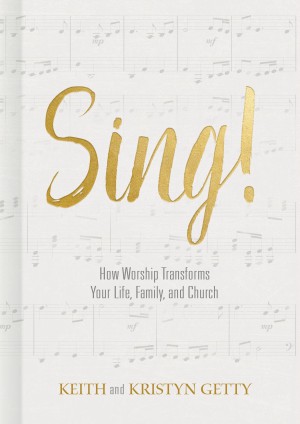10 Christmas carols everyone should know
By Keith Getty

Hustle. Bustle.
It’s all too easy to look up at the end of December and—poof—like excess glitter in the floor that fell from some cheap ornament, the moment gets vacuumed up or packed away for next year like another decoration.
So this Christmas, how can we truly be present and not just buy presents?
The answer is surprisingly found in the most fundamental of places—in singing traditional carols together. Redemption drew a baby breath that first chilly Christmas night, offering eternal breath to a forlorn world dying to be rescued. And yet even before Jesus lay snuggled up in the manger, the miraculous story of rescue was already being sung about. Mary sang about Him in the Magnificat (Luke 1:46-51). Zechariah sang about Him in the Benedictus (Luke 1:68-79). And of course, on the night of His birth, the skies over Shepherds’ Field became a vertical stage for hosts of choiring angels.
We have literally been created, compelled, and commanded to sing, thus it’s no surprise that the oldest Christmas traditions are the masterpieces of the hymns: the carols. Our sixth annual Christmas event—Sing! An Irish Christmas Tour—features ten timeless hymns none of us should ever forget.
1. Hark! The Herald Angels Sing
One of over 6,000 hymns penned by Charles Wesley, who included it in his 1739 Methodist hymnal. It was later set to music by Felix Mendelssohn, which added dashing majesty to the deeply theological truth of the words. This is among our richest hymns in terms of doctrine, but it got off to a bumpy start. Wesley’s first line originally said, “Hark, How All the Welkin Rings.” The word “welkin” meant “the vault of heaven.” Evangelist George Whitefield did us all a favor by changing the words to “Hark! The Herald Angels Sing.”
We have finished the first half of every Irish Christmas concert with a celebratory arrangement of this song, including an Irish reel and cultural Irish dance, which I suspect would have pleased neither Wesley nor Mendelssohn!
2. Come Thou Long Expected Jesus
Another carol by Charles Wesley, appearing in his book of eighteen Christmas songs in 1745. If I had to name my three favorite carols, this would definitely be one of them. In its advent or its Old Testament context, imagine the centuries of waiting, longing, and weeping coming to their fruition when people—and indeed all of us today in the chaos and emotion that is Christmas—can find our ultimate supernatural rest in Christ.
Israel’s strength and consolation,
Hope of all the earth thou art;
Dear desire of every nation,
Joy of every longing heart.
I can hardly get through this one without crying.
3. O Come, All Ye Faithful
A Christmas call to worship, mostly likely written by John Francis Wade, a catholic artist who created beautiful manuscripts decorated with exquisite floral images. His hymn, Adeste Fidelis, remained a Latin masterpiece for a hundred years before being translated into English by Rev. Frederick Oakeley. For congregational singing, especially when trying to teach harmony or when singing acapella, this carol sings beautifully, which is why it is has often also been a selection to finish our Christmas concerts.
4. In the Bleak Midwinter
Among our most plaintive carols, partly because of the haunting melody by Gustav Holst. The words came from the pen of the English poet, Christina Rossetti, who was born in London in December, 1830. A gifted writer, she dictated her first story to her mother before she was old enough to read and write. She was also lauded as the most beloved poet of her generation. Her hymn, “A Christmas Carol,” appeared in the January issue of Scribner’s Monthly in 1872, and was later set to music under the title, “In the Bleak Midwinter.”
The last stanza has appeared on thousands of Christmas cards: “What can I give Him, poor as I am? / If I were a Shepherd I would bring Him a lamb; / If I were a Wise Man I would do my part, / Yet what I can I give Him: give my heart.” We have edited this carol and added Dvorak’s New World Symphony melody to link it to Simeon’s song, the benedictus, which has proved an effective moment of dedication in our Christmas events.
5. Joy to the World
With its triumph cadence and rousing spirit, Joy to the World was written by the man who is frequently called the “Father of the English Hymn,” Isaac Watts. It was published a 1719 hymnal in which Watts translated, interpreted, and paraphrased the Old Testament book of Psalms, overlaying them with the truths of the Gospel. He called the hymnal, The Psalms of David Imitated in the Language of the New Testament.
“I have rather expressed myself as I may suppose David would have done if he lived in the days of Christianity,” said Watts. His hymn Joy to the World wasn’t originally a Christmas hymn, but history has embedded it into our holiday traditions.
6. O Come, O Come Emmanuel
A medieval Latin hymn dating from the 800s. It was one of a series of antiphons that were sung every December, and it isn’t hard to imagine the mystic beauty of this hymn echoing off the walls of remote monasteries during the Middle Ages. This particular antiphon was discovered by an English minister and musician named John Mason Neale, who rendered it into English and published it in 1851.
7. Joy Has Dawned
A hymn Stuart Townend and I wrote back in 2004 as part of the Apostles Creed collection we put together following the introduction of In Christ Alone. It takes us through the Christmas story, explaining much of the symbolism, and has been a helpful hymn for both children and adults.
Stuart wanted to draw out parts of the Christmas story, such as the gifts of the magi, that aren’t particularly present in other Christmas hymns and demonstrate how those elements are connected to the gospel story and present throughout. Melodically, we wanted to give this carol the same fit and feel you might expect from classic Christmas songs you sang growing up in church so there would be an element of familiarity the first time you sang it.
If you are considering using this with your congregation, we often find it helpful to combine this with a familiar hymn such as Angels We Have Heard On High.
8. Angels we have heard on High
One of the most joyful and well written choruses ever composed. The lyrical journey, which sweeps from “Angels we have heard on high sweetly singing o’er the plain” to the ending lyric, “Gloria, in excelsis Deo,” shines a light on the reality of incarnation in a way that refreshes the soul each time you sing it.
9. O Little Town of Bethlehem
Inspired by a visit to Bethlehem by the American preacher, Phillips Brooks. For the 1867 Christmas worship services at Philadelphia’s Holy Trinity Church, Brooks wanted to write a carol for his children’s choir. Recalling his visit to the birthplace of Jesus, Brooks wrote the words for O Little Town of Bethlehem and handed them to the church’s worship leader, Lewis Redner, who composed the melody. It was first sung by a group of six Sunday School teachers and 36 children.
10. Once in Royal David’s City
This might be the least known of these ten carols, but we mustn’t lose its message or music. Cecil Frances Alexander was a pastor’s wife whose poetry was much better known than her husband’s sermons. She published this carol in her hymnbook for children in 1848. She’s also the author of the children’s hymn, “All Things Bright and Beautiful.” How interesting it is, then, that many consider her works too deep to sing in adult congregations today.
The famous festival of lessons and carols service at King’s College in Cambridge opens every year with this carol, where a boy soprano (nominated that day!) opens the service that is televised around the world with verse one as a solo. If ever we needed empirical evidence that the Irish actually did save civilization, this may actually be it.
How remarkable that every December the greatest themes of the Gospel are carried by the winds, through the malls, into hotels and restaurants and stores and churches as we hear, play, and most importantly, sing the carols of Christmas! They express our highest Christian worship, sharing joy with the world in the bleak midwinter. They remind us that hope has dawned in the little town of Bethlehem, in Royal David’s city, and we should all join the triumph of the skies.
O come, let us adore Him—Christ the Lord!
Image | Gareth Harper | Unsplash
 Many of the thoughts and ideas expressed in this article are expounded upon in Keith & Kristyn Getty’s latest book, Sing! – How Worship Transforms Your Life, Family & Church. To order your copy or learn more visit store.gettymusic.com/uk/product/sing-book-by-keith-kristyn/
Many of the thoughts and ideas expressed in this article are expounded upon in Keith & Kristyn Getty’s latest book, Sing! – How Worship Transforms Your Life, Family & Church. To order your copy or learn more visit store.gettymusic.com/uk/product/sing-book-by-keith-kristyn/
Baptist Times, 01/12/2017